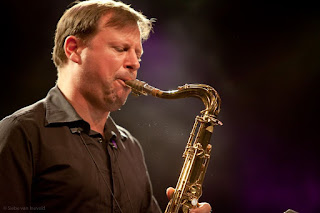Chris Potter brings his tenor sax, chock full of stamina and ideas, to the Jazz Kitchen
 |
| Chris Potter has been among the top tenor saxophonists for two decades. |
Though the repertoire of Potter originals is huge, that overture indicated how original Potter can be when he wrestles with the tradition and updates it with capable 2018 flair. With him on the bandstand were compatible sidemen Adam Rogers, guitar; Fima Ephron, bass, and Dan Weiss, drums.
The quartet effectively unloaded a half-dozen tunes upon a receptive full house. When the composer in Potter rares back and delivers, the performer in him (and in his sidemen) rises to the occasion. His shrugging title to "Pop Tune No. 1" might suggest something quite sketchy, but that proved not to be the case. With triplets underlying the melodic flow, the piece went from mainstream pop to a country feel in Rogers' solo. After a flamboyant Potter cadenza, the performance moved into a rocking rhythm. In sum, a broad expanse of pop sensibility was heartily embraced.
When Potter dips into other idioms, the result still thrusts forward his personal artistry. With electronic help, he set down some patterns on clarinet that served as a backdrop when he switched to tenor. That was on "Good Hope," a reference to the South African headland and thus a signal that an Afro-pop vibe was in the offing. The good-natured churning prevailed throughout, giving a rare solo from Ephron room to dance. The piece's long diminuendo near the end sailed smoothly around the Cape.
Blowing away the distractions of social media by addressing them abstractly, Potter's "Tweet" brought the set to its announced conclusion. It's an abstract, restless piece, fighting against disorder just the way most of us do when we follow Twitter. It was an ideal vehicle for a drum solo, in which Weiss masterfully contrasted cymbals with bass drum.
The tenor saxophonist remains astonishing after many years among the top ranks of his instrument. He pours his huge tone through the horn with seemingly effortless elan. His wealth of ideas never seems to fail him. There's no part of a piece's prevailing mode or chord structure that he leaves unexplored. His technique is so refined that he can appear to blend something close to the "slap-tonguing" of old to the "sheets of sound" Coltrane was acclaimed for when that master became a star at a moment's notice. It can't be easy to get such flow and detachment simultaneously and profusely.
There were only two episodes of the set that puzzled me. He introduced a bracing version of Bob Dylan's "It Ain't Me, Babe" with a peculiar cadenza on flute. I couldn't discern what it contributed to the quartet's romp through the song. Rogers' solo was particularly wry, well-founded, and reflective.
The second puzzler came at the end of the encore, "I Fall in Love Too Easily," for which standard the quartet deftly scaled back the intensity. It was a fine exposition of Potter's harmonic and melodic freedom, well-supported by his bandmates. But in the coda the saxophonist seemed to wander into another key, and I sensed that Rogers wasn't sure whether the boss was going "outside" for a bit or actually changing tonal centers. Maybe it was meant as an analogue to the perils of falling in love too easily; it sure felt like it.
I'm quite ready to give Potter the benefit of the doubt, however. From the security and bravura he exhibited throughout the generous set, it was pretty clear that — like Nikki Haley — he doesn't get confused. And he's likely less arrogant about that than the U.S. ambassador to the United Nations.



Comments
Post a Comment